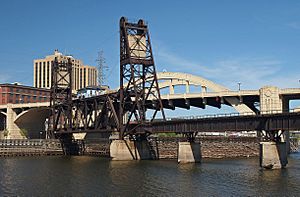St. Paul Union Pacific Vertical-lift Rail Bridge facts for kids
Quick facts for kids St. Paul Union Pacific Vertical-lift Rail Bridge |
|
|---|---|

The St. Paul Union Pacific Vertical-lift Rail Bridge with the Robert Street Bridge in the background
|
|
| Coordinates | 44°56′39″N 93°05′18″W / 44.94417°N 93.08833°W |
| Carries | One track of the Union Pacific Railroad |
| Crosses | Mississippi River |
| Locale | St. Paul, Minnesota |
| Maintained by | Union Pacific Railroad |
| ID number | L332 |
| Characteristics | |
| Design | Vertical-lift bridge |
| Total length | 940 feet |
| Width | 21.9 feet |
| Longest span | 192 feet |
| Clearance below | 72 feet (with span lifted) |
| History | |
| Opened | 1913 |
The St. Paul Union Pacific Vertical-lift Rail Bridge is a special kind of bridge that can lift its middle section. It crosses the Mississippi River in downtown St. Paul, Minnesota, United States. This bridge is one of only three vertical-lift bridges found along the entire Mississippi River. The other two are the Hastings Rail Bridge in Hastings, Minnesota, and the Wabash Bridge in Hannibal, Missouri.
This impressive bridge was designed by a company called Waddell & Harrington and was finished in 1913. Years later, in 1925, the north end of the bridge was raised about 16 feet (4.9 meters). This change helped it connect better with the train tracks leading to the St. Paul Union Depot yard.
How the Bridge Lifts
The St. Paul Union Pacific Vertical-lift Rail Bridge has tall towers that are 105 feet (32 meters) high. These towers hold the cables and machinery that lift the bridge. When it was first built, the bridge could lift its middle section up to 45 feet (13.7 meters) high. This allowed tall boats to pass underneath.
However, by 1973, the lifting equipment was getting old. Because of this, the bridge could only lift its middle section by 37 feet (11.3 meters). Even with this change, it still works to let river traffic go by.
Bridge History and Ownership
The Chicago Great Western Railroad originally built this bridge. Later on, this railroad company became part of the Chicago and North Western Transportation Company. This means the bridge changed hands over time.
Another bridge, the Robert Street Bridge, was built nearby in 1926. Engineers had to be very careful when designing the Robert Street Bridge. They made sure it would fit perfectly without getting in the way of the existing railroad bridge.
Protecting the Bridge from Floods
In April 1997, the Mississippi River experienced very high water levels. The water reached the very bottom of the bridge's main section. To protect the bridge from being washed away by the strong current, the Union Pacific Railroad took action.
They placed a train of hopper cars filled with heavy rocks onto the bridge. The extra weight from the rocks helped to hold the bridge down. This clever idea kept the bridge stable and safe during the flood.
 | Frances Mary Albrier |
 | Whitney Young |
 | Muhammad Ali |

